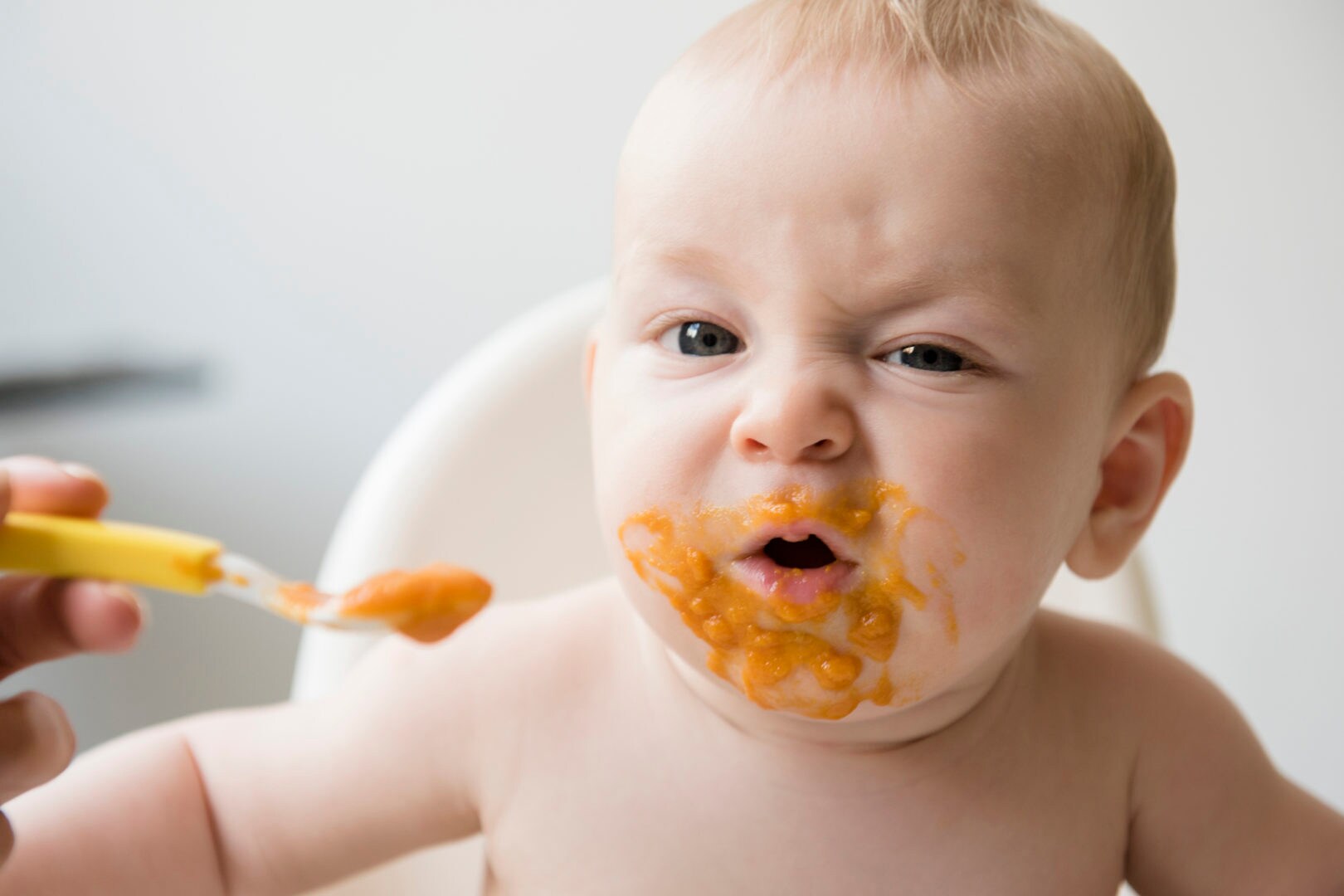Few baby products are more important than baby food, which is why a disturbing new report that claims 95% of baby foods contain toxic heavy metals has many parents on high alert. The report, published Oct. 17, 2019, by Healthy Babies Bright Futures, contains results from tests of over 168 different store-bought baby foods from 61 brands that found evidence of scary contaminants like mercury, arsenic, cadmium and lead.
What baby foods were tested?
The study tested foods from the some of the most popular U.S. brands, including Gerber, Beech Nut Organics, Earth’s Best, Ella’s Kitchen, Similac, Enfamil and others. The tested foods were rice puff snacks, teething biscuits and rice rusks, infant rice cereal, fruit juice and packaged carrot and sweet potato purees.
What was found in the baby foods?
Of the foods researchers tested, they found 95% contained lead, 73% contained arsenic, 75% contained cadmium and 32% contained mercury. One in four of the baby foods contained all four of the heavy metals.
This isn’t the first study to confirm the presence of heavy metals in foods for babies and children. In 2017, the Environmental Defense Fund conducted their own research, which detected lead in 20% of 2,164 randomly tested baby food, apple juice and grape juice samples. Earlier this year, Consumer Reports confirmed the presence of arsenic, cadmium and lead in nearly half of 45 different fruit juices. Consumer Reports also alerted the public to the presence of arsenic in rice products all the way back in 2012.
In response to these and other studies, the Food and Drug Administration (FDA) announced in 2017 that they have committed to limiting consumer exposure to heavy metals in food, but Happy Babies Bright Futures reports that 88 percent of the baby foods they tested currently have no enforceable federal safety limit for arsenic, lead, and other heavy metals.
What’s the risk to children?
All the heavy metals found in the baby foods tested are known potential neurotoxins that can impact children’s brain development, according to the study. The Centers for Disease Control and Prevention (CDC) notes that there is no known safe blood lead level for children, and lead exposure has been linked to everything from behavioral problems to nerve damage. The FDA links long-term arsenic exposure to skin disorders and increased risks for skin, bladder and lung cancers. And the CDC reports that mercury has been linked to memory problems and damage to the nervous system, though this effect is only present after long-term exposure to large amounts.
What is most worrisome is that exposure levels can increase with each contaminated food a baby or child consumes.
“Even in the trace amounts found in food, these contaminants can alter the developing brain and erode a child’s IQ,” the Happy Babies Bright Futures researchers write. “The impacts add up with each meal or snack a baby eats.”
What safety precautions can parents take?
Parents put a lot of trust in baby food makers, and they expect the food they’re feeding their children to be safe. So how can parents protect their children from this threat?
Luckily, there are a few ways to limit babies’ exposure, and none of them involve boycotting store-bought baby foods.
Here are some of the safety suggestions found in the report:
-
Limit rice-based snacks: Rice is one of the biggest offenders when it comes to heavy metals. Researchers suggest limiting rice-based snacks and opting for oatmeal or grain-based snacks and cereals instead. According to the report, swapping out rice cereal for oatmeal or multigrain cereal will result in an 84% reduction in heavy metal exposure.
-
Swap out the juice: Offering water to babies instead of fruit juice could decrease heavy metal exposure by 68%, according to the report.
-
Try teething alternatives: Instead of teething biscuits, parents can offer pieces of frozen banana or zucchini in a mesh feeder, which the report says cuts the risk of exposure to heavy metals by as much as 91%.
-
Choose a variety of vegetables and fruits: Carrots and sweet potatoes are at a higher risk for heavy metal exposure. Feeding baby a variety of fruits and veggies can drop the risk of exposure by 73%.
What else parents need to know
Worried parents should also know that this problem is not unique to baby food and even occurs in organic foods. So if you’re feeling guilty for buying juice or non-organic packaged snacks, you shouldn’t.
“Heavy metals are naturally occurring in soil and water and are found at elevated levels in fields polluted by pesticides, contaminated fertilizer, airborne contaminants and industrial operations,” the report states. “Food crops uptake these metals naturally. Leafy greens and root crops like carrots and sweet potatoes retain more than most other types of fruits and vegetables. How the food is processed may also affect the levels. Organic standards do not address these contaminants, and foods beyond the baby food aisle are equally affected.”
What can parents do to start change?
To address the problem, Happy Babies Bright Futures has created a petition to ask the Food and Drug Administration (FDA) to take action in reducing the amount of heavy metals present in baby food. Researchers also say it should be on the FDA and on baby food companies — not parents — to solve the problem.
As Dr. Philip Landrigan, a pediatrician and director of the Program in Global Public Health and the Common Good at Boston College, says in a press release: “Parents can protect their babies today by choosing nutritious and affordable alternatives to the most contaminated foods. And, to protect the babies of tomorrow, the food companies and the FDA need to step up and do more.”




